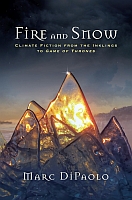Fire and Snow
Climate Fiction from the Inklings to Game of Thrones
Author(s)
DiPaolo, Marc
Collection
Knowledge Unlatched (KU)Number
6365Language
EnglishAbstract
Fellow Inklings J. R. R. Tolkien and C. S. Lewis may have belonged to different branches of Christianity, but they both made use of a faith-based environmentalist ethic to counter the mid-twentieth-century's triple threats of fascism, utilitarianism, and industrial capitalism. In Fire and Snow, Marc DiPaolo explores how the apocalyptic fantasy tropes and Christian environmental ethics of the Middle-earth and Narnia sagas have been adapted by a variety of recent writers and filmmakers of "climate fiction," a growing literary and cinematic genre that grapples with the real-world concerns of climate change, endless wars, and fascism, as well as the role religion plays in easing or escalating these apocalyptic-level crises. Among the many other well-known climate fiction narratives examined in these pages are Game of Thrones, The Hunger Games, The Handmaid's Tale, Mad Max, and Doctor Who. Although the authors of these works stake out ideological territory that differs from Tolkien's and Lewis's, DiPaolo argues that they nevertheless mirror their predecessors' ecological concerns. The Christians, Jews, atheists, and agnostics who penned these works agree that we all need to put aside our cultural differences and transcend our personal, socioeconomic circumstances to work together to save the environment. Taken together, these works of climate fiction model various ways in which a deep ecological solidarity might be achieved across a broad ideological and cultural spectrum.
Keywords
Literary CriticismDOI
10.1353/book.100026ISBN
9781438470474Publisher
State University of New York PressPublisher website
http://www.sunypress.edu/Publication date and place
2018Grantor
Imprint
SUNY PressSeries
SUNY Press Open Access,Classification
Literature: history and criticism


 Download
Download